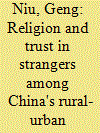| Srl | Item |
| 1 |
ID:
187905


|
|
|
|
|
| Summary/Abstract |
This paper examines the relationship between the large-scale construction of broadband infrastructure and digital financial inclusion in rural China. To make causal inferences, we exploit a quasi-natural experiment and use a difference-in-differences identification strategy with a panel dataset of Chinese counties from 2014 to 2018. The results show that broadband infrastructure significantly contributes to digital financial inclusion. Furthermore, we distinguish between two dimensions of digital inclusion, namely, coverage and usage. We find that while broadband infrastructure promotes the coverage dimension, its effect on the usage dimension is limited. In addition, the effect of broadband infrastructure on digital financial inclusion in the usage dimension is larger in areas with higher levels of human capital, higher levels of social capital, and higher penetrations of bank branches. Accounting for these moderators is important to fully harness the potential of broadband infrastructure for financial inclusion.
|
|
|
|
|
|
|
|
|
|
|
|
|
|
|
|
| 2 |
ID:
161864


|
|
|
|
|
| Summary/Abstract |
During China's rapid urbanization, the social marginalization of its rural-urban migrants has attracted increasing scholarly and social attention. At the same time, China is experiencing a rising tide of religion, the impact of which on social integration remains unexplored. Based on a large-scale survey for rural-urban migrants, we find that being a religious believer is associated with a higher level of trust towards strangers. In addition, participating in religious-related activities has a positive impact on trust for both believers and non-believers. We test the robustness of our results using instrumental variable analysis. We conjecture that prosocial values in religious teaching and social interaction opportunities contribute to rural-urban migrants' generalized trust. Our results indicate that informal institution such as religion can be important in forming social capital for marginalized social groups.
|
|
|
|
|
|
|
|
|
|
|
|
|
|
|
|